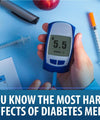How to reduce diabetes- Read on to know the top 5 ways
Recent Post
Weight gain without overeating: is
Feb 15, 2023
Neem For Diabetes: 6 Researched
Nov 03, 2022
Do you know the most
Nov 02, 2022
Start Eating These 7 Fruits
Oct 28, 2022

prakash singh
Wellness Strategist
Aug 10, 2022
“I am waiting for the day when I can say I HAD diabetes”
This quote used during World Diabetes Day, truly points out how those with diabetes are wanting to reverse their condition.
In this blog, we have gone the extra mile to simplify the concept associated with diabetes. But before we move on to how to reduce diabetes, let’s first talk about what causes diabetes.
Though more than 77 million people in India have successfully detected their diabetes, there is still a major proportion of the population living in delusion. They either don’t know they have it or their body hasn’t given out any symptoms. This is a classic example of prediabetes.
It is a situation where you are close to catching any type of diabetes especially Type 2 but your body is adamant and not giving away any symptoms.
Now, what can you do in this case? Before going to detection and causes, it is important that you know what the pancreas is and what role it plays.
You might never associate Pancreas as the most vital organ of your body until someone in your close affinity or you yourself face diabetes. Truth to be told, Pancreas is that essential organ of the body that you cannot live without.
Located in your abdomen, the pancreas is made up of life-giving cells. Jody Stanislaw in her TedxSun Valley explains the functioning of these cells in the simplest way possible.
“Anytime you eat sugar or highly refined carbohydrates, that sugar circulates in your blood from head to toe, throughout your body. The cells are the security guards for your blood and as soon as they see this rush of sugar, they send SOS signals. The team of dump trucks then comes in to throw out all the sugar.”
The dump trucks that she mentioned in her speech are nothing but insulin. It is made inside your pancreas and regulates your metabolism by transferring all the sugar present in your blood to your liver and muscles. Excess sugar may also be stored as fat and is used as energy later.
If the sugars eaten in your diet are safely transported and saved by insulin without any hassle, your pancreas is doing a good job. And you need not worry about your overall well-being.
But there comes a time when your pancreas is overworked in terms of churning out more and more insulin. Right here, the condition of diabetes comes into the picture.
What is Diabetes?

Diabetes is a condition in which blood sugar levels of your body are way too high. These blood sugars remain unregulated for a long time causing distress.
Every diabetes case is a serious one because of the following reasons:
- Since cells of your pancreas aren’t functioning well, insufficient insulin levels leave your brain nerves, eyes, and kidneys in danger.
- Since your body is not able to process the sugars, body cells receive less energy and do not perform functions efficiently.
There are various types of diabetes. Each type has its unique causes, symptoms and treatments. Therefore, before taking measures to gain freedom from diabetes, you should know which diabetes you are suffering from.
What is Prediabetes?
Before going to types of diabetes, let’s touch upon prediabetes first.
Prediabetes is a situation in which your blood sugar levels are higher than normally accepted levels. Due to this, your pancreas has to work overtime to churn out more and more insulin.
Due to the stress placed on your pancreas, there are chances that you may develop Type 2 diabetes. But at this stage, it is not high enough to be considered as Type 2 diabetes.
Coming to the causes of prediabetes, this situation is either passed onto you through genes or you’re developing it from an inactive lifestyle.
Regular consumption of a bad diet which includes excessive calories and lack essential nutrients, is again one of the major factors that cause people to develop prediabetes.
Now you might ask, how to know if you have prediabetes. Generally, there are no symptoms of prediabetes. It is only possible through the HbA1c test which helps you detect diabetes even when it's at a pre-stage.
However, if you notice increased thirst and frequent urination, they might be suggesting that your prediabetes has moved to type 2 diabetes.
But you don’t want that, right? So, in order to avoid these chances of developing Type 2 diabetes, you must adopt healthy lifestyle changes and stop this from becoming a reality.
Types of Diabetes

Here are the 4 types of diabetes that people may develop when the system doesn’t work properly:
Type 1 diabetes
In Type 1 diabetes, your body produces very little or no insulin at all. No insulin would mean cells neither transport sugar nor create energy.
Now, the question arises why does it happen? Why does your pancreas not perform such a crucial function?
It happens because of an autoimmune response. It means that your body has destroyed all the insulin-producing cells in the pancreas.
As per the reports, type 1 diabetes can occur at any age and accounts for approximately 5% of the total Indian population.
Type 2 diabetes
About 95% of diabetes cases are of type 2 diabetes. Here, either your body doesn’t produce enough insulin or the produced insulin isn’t performing its function well. You see that they’re two branches to this type of diabetes.
In both cases, the blood sugar levels shoot up because a higher proportion of sugar is left untreated.
In fact, overweight individuals can face this condition because the buildup of fat can act as a hindrance to insulin. And insulin fails to perform its job properly. However, it doesn’t mean that healthy individuals cannot face Type 2 diabetes.
Gestational Diabetes
The last one in the types of diabetes is gestational diabetes. It is faced by women during pregnancy typically between the 24th and 28th weeks of pregnancy.
Since you produce insulin-blocking hormones, your body has high levels of sugar with no apt levels of insulin to convert them into energy.
Developing this diabetes doesn’t mean that you had diabetes before pregnancy or will have it afterwards. However, if poorly treated, there are chances that either you will develop Type 2 diabetes post-pregnancy or your child might develop it.
What are the symptoms of Diabetes?
Your body never fails to give away hints when developing any condition or disease. Following are the general symptoms of diabetes:
- Increased hunger
- Excessive thirst
- Frequent urination
- Changes in weight
- Dry mouth
- Itchy skin
- Blurred vision
- Extreme fatigue
Here are the specific symptoms of each of the 4 types of diabetes:
Type 1 diabetes
Symptoms of type 1 diabetes include:
- Frequent urination
- Increased thirst
- Genital Itching
- Slow healing of wounds
- Blurred vision
- Tiredness
- Unplanned weight loss
- Nausea and vomiting
Type 2 diabetes
Symptoms of type 2 diabetes can include:
- Increased urination
- Frequent thirst
- Thrush or genital Itching
- Blurred vision
- Yeast infections
- Slow-healing sores and cuts
Gestational diabetes
Again, gestational diabetes does not include any symptoms. The following symptoms that suggest your gestational diabetes may have moved to type 2 diabetes are:
- Yeast infections
- Fatigue
- Excessive thirst
- Increased urination
- Blurred vision
As you can see that most of the symptoms overlap in all 3 types of diabetes, it is suggested to get your condition confirmed by a healthcare professional. They’ll ask you to get a blood sugar test or glucose tolerance test.
What are the possible causes of Diabetes?
Different types of diabetes have different causes. Let’s have a look at the causes one by one:
Type 1 diabetes
As discussed above, when your immune system destroys insulin-producing cells, your body suffers from Type 1 diabetes. Now, you may ask why does the immune system do it?
Many kinds of research have been conducted in this area, but no specific cause has been found. Except, some triggers have been detected that are found in individuals with Type 1 diabetes. These are the possible triggers:
- Chemical toxins present in food
- Bacterial infection or virus that set off your immune system
- Or genetic disposition that may have caused this autoimmune reaction
Type 2 diabetes
In type 2 diabetes, the following are the possible causes:
- Obesity
- Bad diet
- Increasing age
- Inactive lifestyle
It is therefore caused by the combination of genetic and lifestyle factors. It is important to note that pregnant women and those with illness are prone to type 2 diabetes.
Gestational Diabetes
Diabetes in pregnancy is known as gestational diabetes. It is highly likely caused by the hormonal changes women face during pregnancy. Following are the possible triggers of gestational diabetes:
- Family history
- Obesity
- History with PCOS
How to detect Diabetes?

After causes and symptoms, comes the detection of diabetes. I’ve got you covered.
Following are the three ways that can be used to diagnose diabetes:
Fasting glucose test
This test measures if the levels of sugar present in your body qualifies the healthy bracket. It requires you to fast for 8 hours after which your glucose levels are tested.
Oral glucose tolerance test (OGTT)
This test measures how your body responds to sugar. This test involves testing of glucose levels post drinking a sugary drink to assess the after-effects.
HbA1c test (Glycated Haemoglobin)
It is a blood test that helps you detect diabetes. Glycated means sugar and Haemoglobin translates to blood. Hence, it is a method to check your blood sugar levels. This test shows how your body is managing glucose over time.
How to reduce Diabetes naturally?

Once diabetes is detected, your healthcare professional will suggest medications. But that’s not all!
Medications alone don’t prove effective in reducing diabetes. There are some extraordinary natural ingredients like Neem, Karela, Gurmar even Triphala etc that help reduce pre diabetes readings. You need to adopt lifestyle changes to successfully contribute to this process of reversing diabetes.
Following are my suggestions for you to maintain a healthy lifestyle:
Weight Management
You must have noticed how obesity is a common cause of all types of diabetes. In order to reverse this condition, you must focus on managing a healthy weight. Few easy yogasanas for diabetes and exercises can be considered seriously.
Research published in 2017 concludes that moderate weight loss is important to deal with any type of diabetes. Set an achievable goal like losing 5 to 10% of your current weight and don’t be too hard on your body.
Healthy balanced diet
It is essential to follow a healthy and balanced eating plan for both type 1 and type 2 diabetes. Idea is to include food items of crucial importance with fewer calories such as pulses, plenty of whole grains, fruits and vegetables.
For example, fibre-rich products are great in lowering the risk of diabetes. Packaged and carbonated drinks have the most calories, therefore their consumption should be limited. Also, avoid processed meats.
A 2019 research reported how weight loss is a major challenge for individuals but a healthful diet plan achieved blood glucose stability and ultimately helped reduce diabetes medication in the long run for people suffering from diabetes.
Engage in a moderate exercise
In order to reduce diabetes naturally, you need to engage in regular exercise. It not only helps you burn calories but will also lower your blood sugar levels. Start slow with the help of a healthcare professional who can suggest you a workout routine that you can use to build up to your goals.
In fact, in order to maintain a healthy weight, you need to rely on this measure. Further inactivity and no physical exercise can introduce complications associated with diabetes.
Healthy habits
Following are the healthy lifestyle habits that you should consider inculcating:
- Quit smoking because it creates resistance to insulin-producing cells that will worsen type 2 diabetes.
- Stress can worsen any condition. Make sure to take small breaks at work and indulge yourself in a hobby that can successfully divert your brain when needed.
- Goes without saying, buy ‘sugar-free’ foods.
Take herbs or supplements
Herbs like Vijaysar (Indian Kino tree), Gurmar (Gymnema Sylvestre), Neem, Karela (Bitter gourd), Jamun (Indian blackberry), Methi, Ghritkumari (Aloe Vera), Chirata (Bitter stick) and Triphala have strong anti-inflammatory properties that protect insulin-producing cells present in your pancreas. This improves insulin secretion and serves the right base to defeat diabetes.
For your ease, GoYNG has put together all the goodness of all the above-mentioned herbs to formulate a diabetes supplement drink called DiabaLife juice. It is one of the best Indian diabetes supplements effective in balancing your blood sugar levels by increasing glucose tolerance and reducing insulin resistance.
Check out GoYNG’s CMIRD-approved DiabaLife care pack for better efficacy here.
Conclusion
It is possible to reduce diabetes with proper medication and lifestyle changes. As they say, prevention is better than cure, herbal supplements are a great way to derive potent anti-inflammatory properties that protect your pancreatic cells.
Are you ready to defeat diabetes and step into healthy living?
We hope this blog has helped you find answers on how to reduce diabetes naturally. Do mention in the comments if you have any unanswered questions about diabetes. We will be happy to take them up!
FAQs
Diabetes is mainly caused by insufficient insulin production.
Increased hunger, excessive thirst and frequent urination are general symptoms of diabetes.
Diabetes Insipidus is a rare condition in which your body suffers an imbalance of water. This causes your body to produce a lot of urine that is odourless.
The HbA1c test is conducted to detect diabetes. It is a useful indicator of how well your body manages glucose.
A 2017 research shows how Prediabetes has chances of progression associated with it. If not managed well, you are highly likely to develop Type 2 diabetes.
Proper medication and lifestyle changes (such as weight management and a healthy balanced diet) are effective in lowering diabetes.
Blueberries, Avocados, Chia seeds, Cinnamon and Mangos are effective in limiting blood sugar intake. Hence, they are safe to consume.
Vitamin B12 is the best vitamin for type II diabetic people.
A healthy balanced diet and herbal supplements help you reduce diabetes naturally. The former lower sugar intake while the latter protects insulin-producing cells.
Yes! There exists herbal supplements which help you lower your blood sugar levels and reduce all three types of diabetes.
GoYNG has formulated the best diabetes supplement known as DiabaLife care. It is approved by CMIRD and contains the goodness of the following herbs:
- Vijaysar (Indian Kino tree)
- Gurmar (Gymnema Sylvestre)
- Neem
- Karela (bitter gourd)
- Jamun (Indian blackberry)
- Methi
- Ghritkumari (Aloe Vera)
- Chirata (bitter stick)
- Triphala
Yes! Jamun is the best food for diabetes control and management. Taking Jamun daily helps diabetic patients control their blood sugar levels and enhances the body's immune response to an antigen.
White bread, tortillas, cakes, muffins and flavoured coffee drinks must be avoided when you have been diagnosed with diabetes.
Diabetic people should avoid the following:
- Smoking
- Processed food
- Carbonated and sugary drinks
All sorts of processed and preserved food items are a big no for a diabetic person.
← Older Post Newer Post →
© 2022, WellthyLife. All Rights Reserved.








